Dominic Raab: The uncompromising, unapologetic karate black belt who lacks the human touch
The foreign secretary’s steely determination and supreme self-confidence have landed him one of the top jobs in government – but something is missing, writes Sean O’Grady

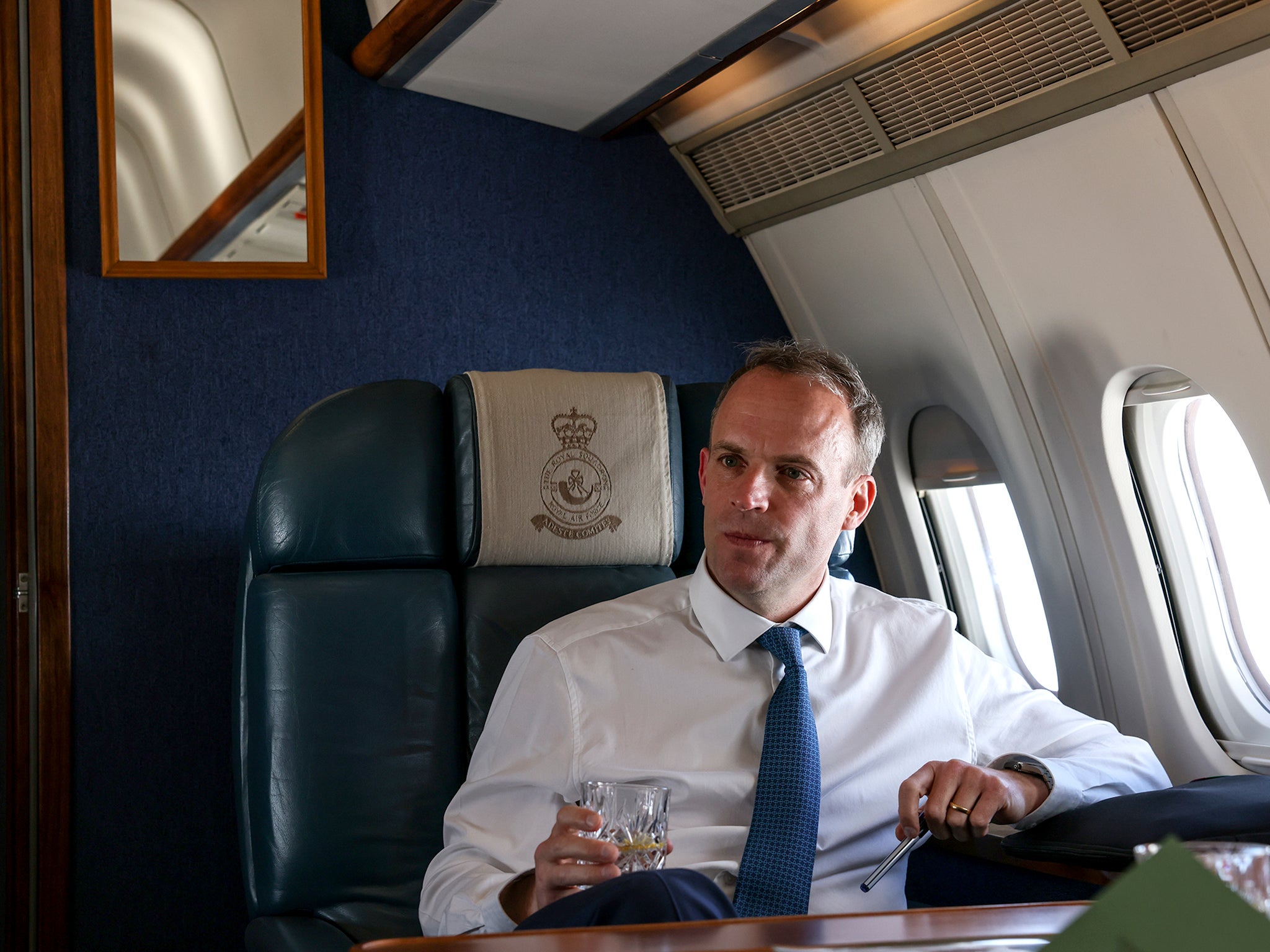
Dominic Raab is a very odd man. Even by the standards of Westminster, he is unusual, and mostly in a bad way. When he launched his now half-forgotten campaign to be Tory leader and prime minister in 2019, he said it was “a moment for calm, steely determination”, that is to get Brexit done.
He might have been right, but if anything, Raab suffers from a bit too much calm, steely determination. He is certainly a man driven, and in everything he does, he has his foot flat to the floor on the accelerator. He has no brakes and little apparent instinct for moderation or reflection when in the heat of “the moment”. His quietly spoken, almost diffident manner belies a consistently uncompromising mindset. In other words, he’s a bit of a nutter.
That’s a bit worrying, too, because not only is the Secretary of State for Foreign, Commonwealth and Development affairs, a traditional “great office of state”, but he is also First Secretary of State, and thus formally the most senior member of the cabinet after the prime minister. Boris Johnson might have given him the role and titles because he represented no real threat, and to put Michael Gove in his place, but when Johnson fell ill with Covid last year, it was Raab who stood in for him, chairing committees and taking questions in the Commons.
It was a curiously hesitant performance, during which all those involved – Raab, Gove and then-health secretary Matt Hancock – looked too frightened to take any decisions because of what might happen when (if) Johnson got back to work. In any event, Raab didn’t disgrace himself, but failed to make much of a memorable impression, at PMQs or anywhere elsewhere.
How he might behave if he were actually in power on a permanent basis is more worrying. He’d certainly attend to his briefings more readily than Johnson, and he’d be no wobbly shopping trolley unable to keep to a course of action, but he’d be rather less willing to listen to others and would be rather less popular with the public. For some reason, Raab seems not to realise this, or will not do anything about it. Rare is the politician who can take that attitude and succeed.
It is difficult, for example, to understand his decision to reject the advice of his senior advisers to make that call to his Afghan counterpart about rescuing the interpreters. Unless, that is, you appreciate just how certain of himself Raab is, far beyond the usual standards of arrogance found in most high-flying ministers.
According to the testimony of some with experience in these matters, foreign office officials are always careful not to disturb a minister on holiday, as Raab was with his family in Crete, unless it is essential. Such emergencies can crop up even in the holidays or “silly season”, so the interruptions can be more frequent than outsiders assume, but the intrusions on rare family time are rationed.
No doubt Raab was applying himself with this usual assiduousness to his duties, but he made the wrong decision on the phone call – not because he was lazy but because he thought he knew best. He has to take responsibility for that, though it seems an ingrained personality trait he can’t do much about. He has since put out a thin defence of his actions, but, tellingly, avoided doing so on camera or submitting himself to interviews. This is revealing, for he is a man who loves an argument; so it suggests he knows he got it wrong.
He has also pulled in some favours from those (few) politically loyal and close to him, who’ve been on Twitter defending their friend. David Davis, his long-term mentor and sponsor, says it is inconceivable that such a “workaholic” as Raab could be guilty of such a dereliction of duty. It’s true, as it happens, that Raab loves to work hard and play hard, but that doesn’t mean he gets his judgements always right. James Cleverly, who is one of Raab’s junior ministers at the foreign office, also deployed the “workaholic” defence, and attracted much derision by prefacing his supportive Tweet with an apology for appearing sycophantic.
What has been absent is much vocal support from the prime minister, apart from a short ritual expression of “full confidence”. There was no concerted effort from Downing Street and the whips to get the party to form a defensive square around the Raabster, as he did previously for Priti Patel when she was in trouble.
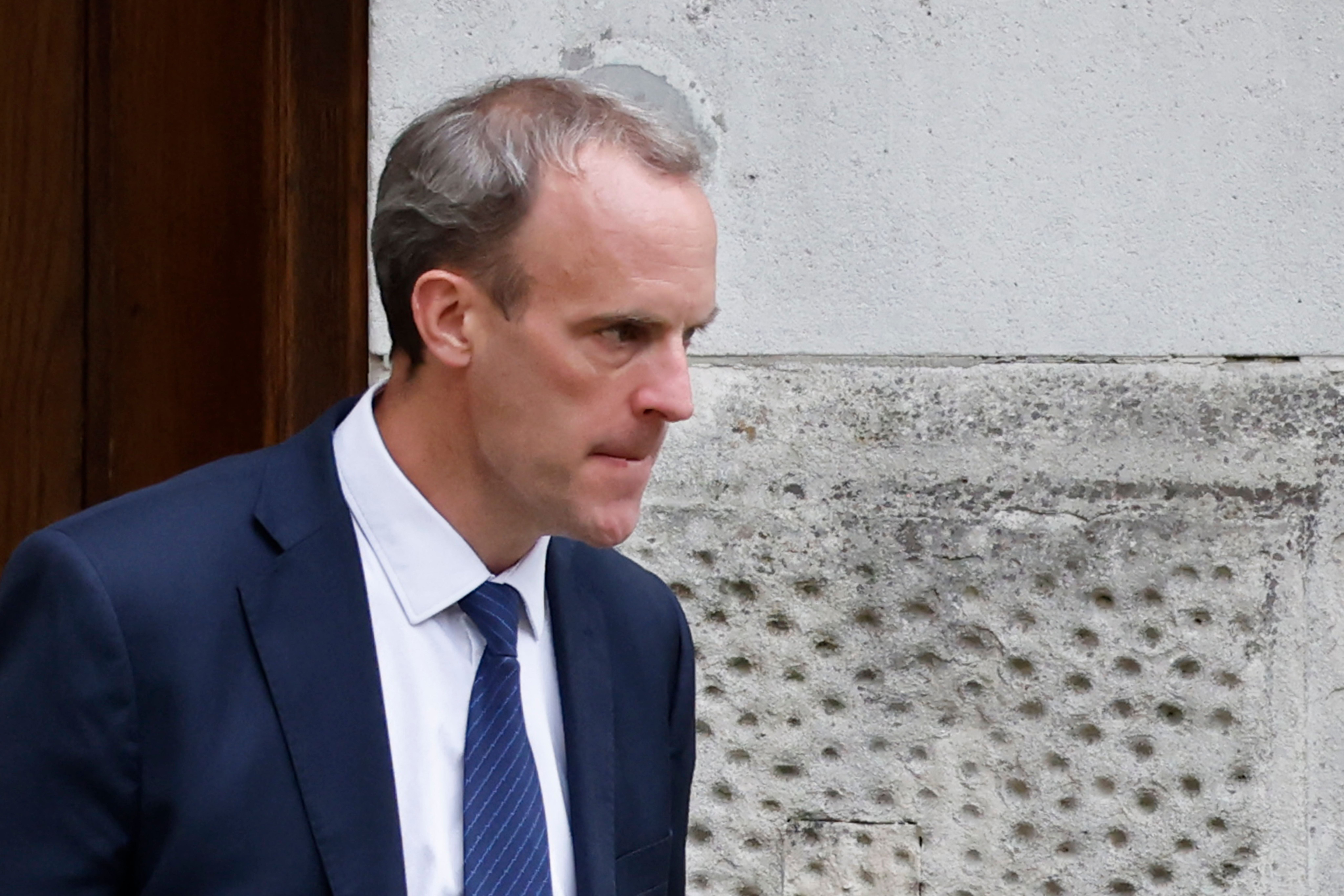
Raab is known for his single-mindedness, and nowhere is this more dramatically evident than in his love of the martial arts. Other politicians have gentler pursuits (or, more commonly, none at all). Ken Clarke has his jazz and bird-watching; John Major enjoys the cricket; Sir Bernard Jenkin is rumoured to be a naturist, where rough and tumble is always ill advised. Raab, by contrast, likes beating people up, albeit within the rules and conventions of boxing and karate. Raab is a literal “political bruiser”. It’s difficult to think of another cabinet minister, now or ever, who could cause an opponent – or random stranger for that matter – real physical harm, but Raab is that man.
This bull-necked and bullet-headed character could do you some mischief if you bumped into him in a dark alley. Until a few years ago he was a regular at a boxing club in Thames Ditton in Surrey, and received high praise from his trainer, Gary Ball, in a BBC profile a few years ago: “He’s here every Sunday. Technically, he’s very good, got a good knowledge of boxing. His defence is fantastic – just a good all-round boxer, one of the boys, great banter…he’s that fit and prepared, he could go out next week”.
Raab, who is also a black belt, third dan (instructor level) in karate, having played competitively from the age of 12 to 30 and being a member of the Great Britain squad. Admirable, but he pushed himself so hard in what was, supposedly, a bit of a hobby that by the age of 36 he had needed hip-replacement surgery, having worn it out with all that kicking. Since then, he told Nick Robinson in an edition of Political Thinking in 2018, he is “allowed to punch and cycle, but not to kick or run”. The irony, and the political parallel, is that his absolute determination can cause a serious self-injury.
Apologies are not the Raab way... he doesn’t say sorry because he isn’t sorry
On Brexit, though, his extremism, notable even by the standards of the Brexiteers, was probably the making of him. Had the 2016 referendum gone the other way, he might now still be a junior minister or lower down the cabinet order. Raab’s luck was that he was in the relatively modest talent pool of committed Leavers who could form the core of the Johnson administration. Like Gove, but unlike say Johnson or zealous converts such as Liz Truss, Raab rightly styled himself a “conviction Brexiteer”, long since reaching the conclusion that the British wanted – and should want – absolute sovereignty and the right to make their own laws, ruled on in their own courts. He was never going to be a Remainer of convenience or out of loyalty to David Cameron (as they say Theresa May was).
Raab’s Euroscepticism was the kind of unrelenting application of logic to the question of parliamentary sovereignty that led Enoch Powell to that same view decades ago, and Raab has that kind of mind, where a conclusion is reached and defended, whatever might be said against it. A lawyer by training, he has applied much the same analytical habit of mind to the question of rights.
Also no doubt inspired by David Davis, whom he served as chief of staff when he was shadow home secretary under David Cameron, Raab came to be, like Davis, obsessive about executive power and rights, and their use and abuse.
Raab has something of a resemblance to the comic character Alan B’Stard, as played by the late Rik Mayall in the satire The New Statesman, and has a tendency to gaffe via unwise candour – he’s usually deliberate about what he says, but just doesn’t care. It’s like he thinks that if people get upset with the truth, then that’s their problem.
Like George Osborne, Raab is not what you’d call a “retail politician”. He lacks something, something like empathy, or the ability to “speak human”, just as the Miliband brothers couldn’t.
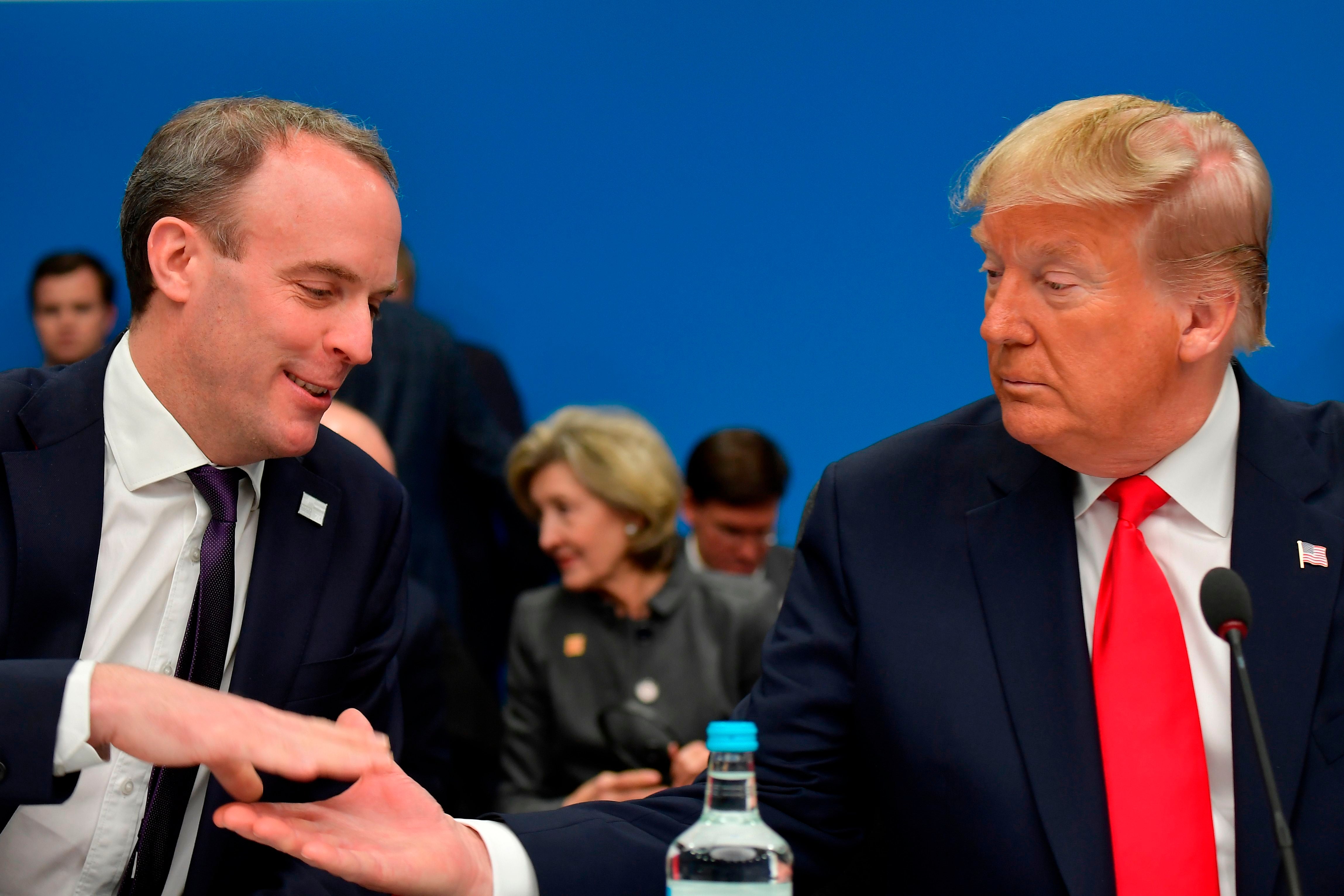
Thus we find an old clip circulating on social media of a clearly juvenile Raab declaring that he doesn’t believe in the Human Rights Act (routine for a Tory boy), but also doesn’t believe in economic or social rights (bit eccentric).
Later on, he made a name for himself by waging war on positive discrimination, both before and after he got into parliament. He earnestly believed and believes that men were and are getting a “raw deal” from the drive to strengthen women’s rights.
Raab also once wrote a column where he expressed distaste about feminists as “obnoxious bigots”, which earned him a public rebuke from the home secretary – and minister for women and equalities at the time, Theresa May. When May became prime minister in 2016, she sacked Raab from government, only to reinstate him later, as a sop to her restless Eurosceptic backbenchers.
Like a Duracell gaffe bunny, Raab just keeps banging out the offensive remarks. He co-wrote a neo-Thatcherite pamphlet called Britannia Unchained which contained the bizarre claim that the British were among the “worst idlers in Europe” (no irony there, of course), and put Britain’s poor productivity down not to low fixed capital investment or educational shortcomings but because “whereas Indian children aspire to be doctors or businessmen [sic], the British are more interested in football and pop music”. You wonder why Raab, Priti Patel, Kwasi Kwarteng and Chris Skidmore produced the abomination that is economically illiterate, cringeworthy and with a hint of racism.
The poor? Just another target. In the 2017 election, Raab went on television and offered the view to a clearly distressed woman that people who use food banks weren’t all “languishing in poverty”, but suffering from a temporary cashflow problem.
Last year he told the viewing public that he only took “the knee” for the Queen and the missus, and said, with a sort of jokey bewilderment, that he thought the gesture seems to be from Game of Thrones. Raab, who is far from stupid or bigoted and should really know better, viewed it as “an act of subjugation”, which it can’t be if Martin Luther King did it in 1963, and people of colour do so now as a mark of dignified, respectful protest. Again, Raab at his most excruciating and needlessly sensitive, and although he claimed to “understand the frustrations”, he plainly didn’t.
Apologies are not the Raab way, but it’s not entirely clear that he has resiled from any of these positions. He doesn’t say sorry because he isn’t sorry.
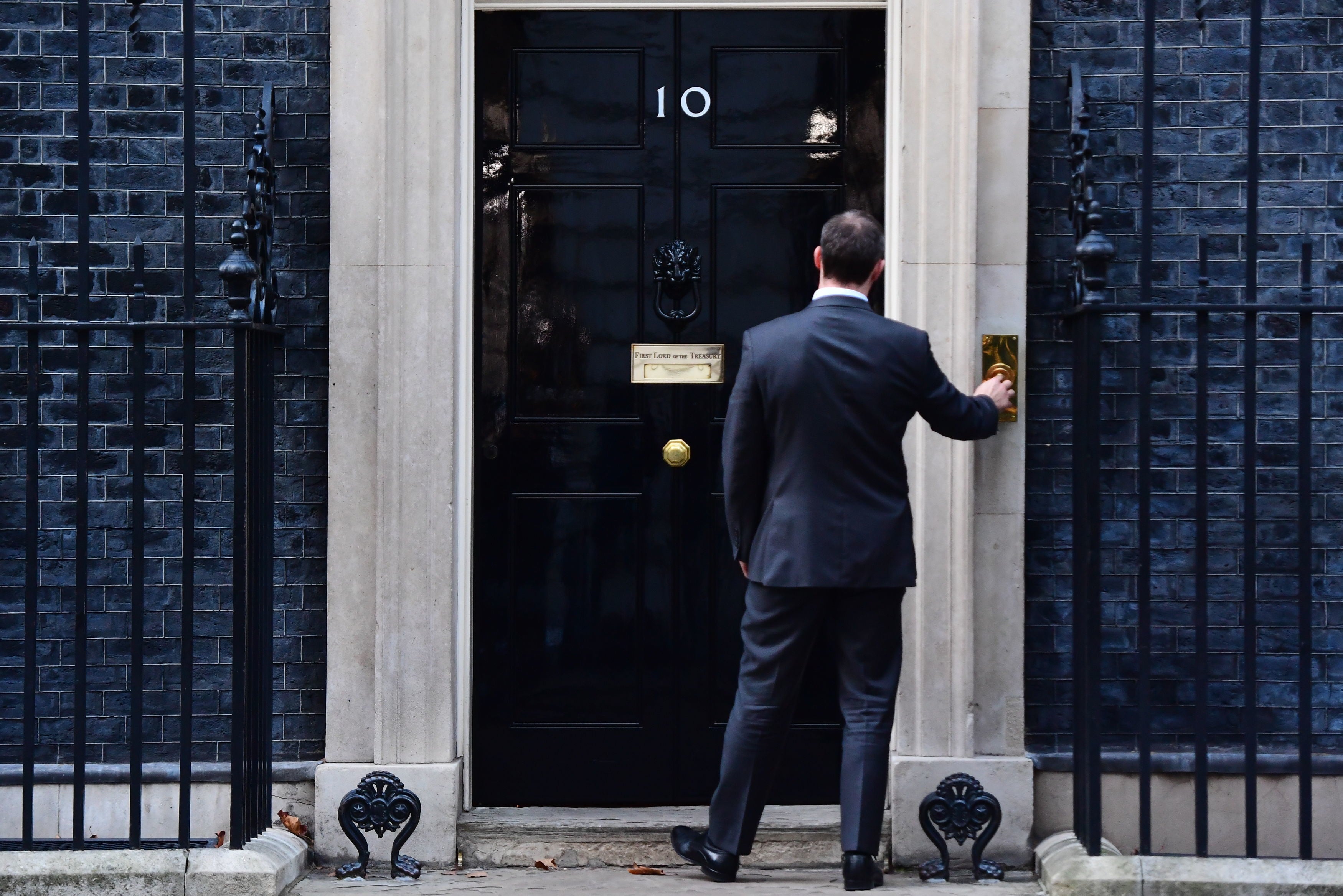
So is there anything to be said for the foreign secretary? Yes, quite a bit. If he isn’t a flawed genius, he is certainly gifted-but-flawed. He has an excellent “back story”, though he rarely makes much of it. In modern political terms, Raab is most like Michael Portillo, another ideologically driven high-flying prodigy of the right who never quite made it.
Like Portillo, whose father fled from the Spanish civil war, Raab’s father was a refugee. Peter Raab left the then Czechoslovakia in 1938, aged six, after the Munich agreement and before the near-certain Nazi takeover and persecution of the Jews. In due course, he settled in Slough and made a career as a food manager for Marks & Spencer. He married Jean, a clothes buyer from Bromley, and Dominic and his sister enjoyed what he later called a “blissful, middle-class” upbringing – not poor, but not privileged, either. They were brought up C of E, and his father wasn’t particularly religious – their heritage was more culinary than theological, with plenty of goulash and strudels.
His father died young, of cancer, in 1986, before Dominic reached his teens, so he also experienced life with a single parent. They were encouraged to think for themselves and make their own minds up. Obviously intelligent and hard-working, Raab went to the local state (non-fee-paying) grammar school, and went on to study law at Lady Margaret Hall, Oxford, and Jesus College, Cambridge, picking up excellent results and the odd prize before going on to be a solicitor at Linklaters, then a legal adviser at the Foreign Office.
So he is certainly smart, and despite that tendency to speak his mind a touch too much, is calculating with it. When David Davis resigned as May’s Brexit secretary over her proposed deal in July 2018, Raab, one of the few capable Brexiteers qualified for the cabinet, had no compunction in stepping over his body and taking over the job – even though Raab was even more Eurosceptic and opposed to May’s policy than Davis.
After only a couple of weeks, May, with her adviser Olly Robbins and later her de facto deputy David Liddington, took personal charge of the negotiations away from Raab, which understandably infuriated him. Word seems to have got back to Downing Street that Michel Barnier and Jean-Claude Juncker were finding Raab too tiresome (confirmed in a later fly-on-the-wall documentary).
Raab, though, carried on in post, though he had comparatively little to do and thought he’d do a better job of Brexit than May and Robbins. He reportedly “felt totally mugged off by the PM”. Raab did quit, in November 2018, “after his first good night’s sleep in weeks”. It was well timed, as May’s deals ran into the parliamentary sand again, but it was none the less a matter of principle, and he wasn’t going to be humiliated any longer.
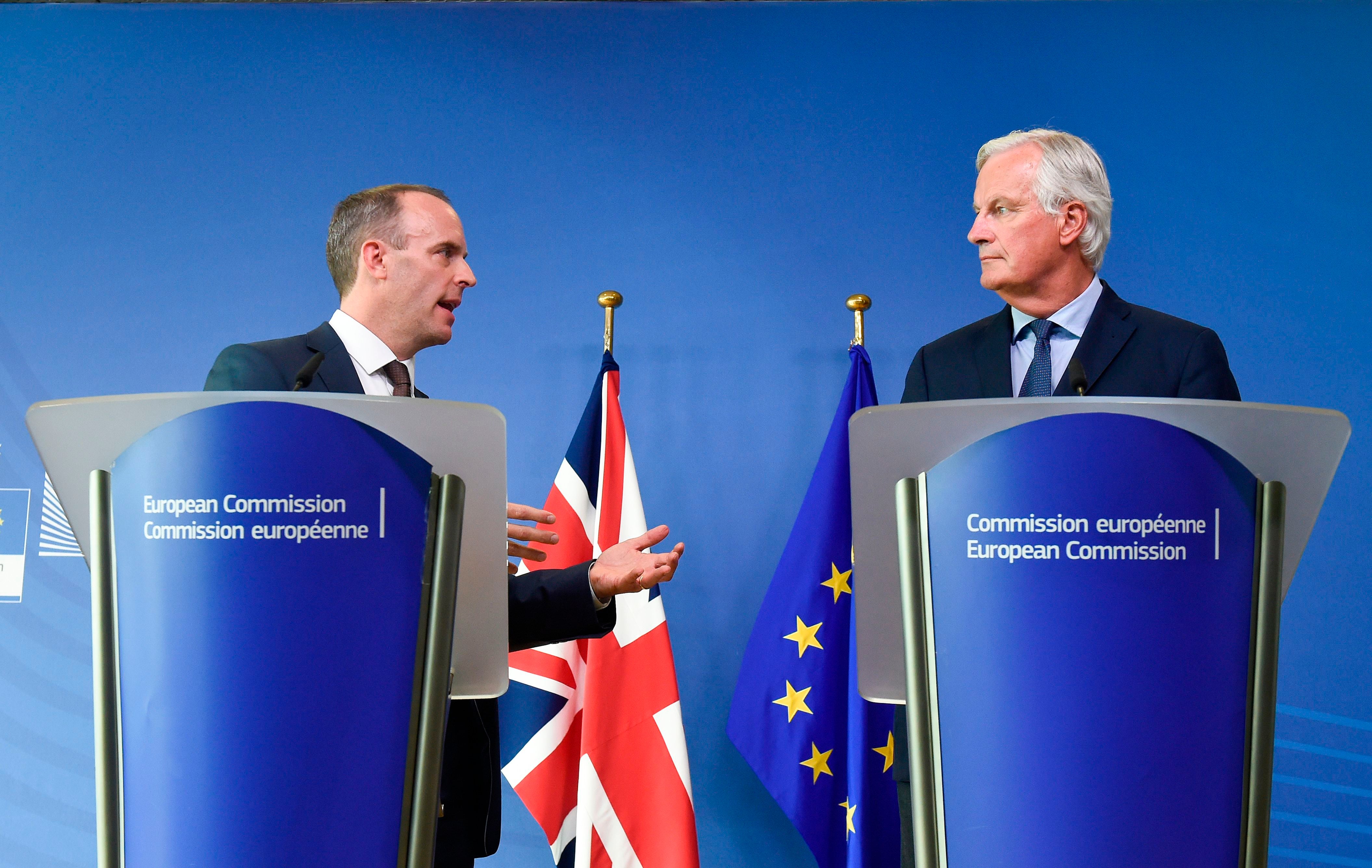
Raab is a patriot, which is a good thing. There’s no reason to doubt that he felt that Britain (as well as himself) had been humbled by the EU in the Brexit talks, and he has that love of country, like Portillo and maybe Patel, that is turbocharged by being the child of a refugee. He tells how there’s a family picture of them at a Silver Jubilee street party, the three-year-old Dominic with a Union Jack sewn into his shorts. Now he is in charge of all the Union Jacks flying over all the British embassies and high commissions in the world.
He is a Thatcherite, but one who is suspicious of crony capitalism (even crediting Jeremy Corbyn for his opposition to that), and who has a remarkably liberal view about giving offenders a “second chance” and redemption (something that he learnt about through a boxing charity) and, once, advocating “bespoke” resettlement packages for asylum-seekers.
He is not quite the identikit Tory right-winger of popular belief, and he has been taken the trouble, when a student, to spend time travelling around Egypt and at Ramallah University, as well as at a Kibbutz, to better understand the other point of view in the Middle East. It’s what you might expect of someone with that kind of background, the son of a refugee, and a lawyerly interest in the arguments and weighing the back the of the evidence.
He also has an anecdote about one of his children that reveals a certain wit, too. Young Peter Raab was five at the time of the 2018 World Cup, and the Raab family was divided in its loyalties because Erika Rey-Raab, a former Google executive, is a proud Brazilian. They’ve been together for almost 20 years, even though Raab, with typical lack of tact, introduced himself by asking if she was Argentinian. It’s a bilingual, binational household – he is no xenophobe – but he asked his boy which said side he’d support. Peter went away for a few minutes, then made his proposal. It would be 50-50, he told dad. The first half of the competition he’d support England, but the second half (for reasons he needn’t explain) he’d be cheering for Brazil. “Not another politician in the family!” came the wifely protest.
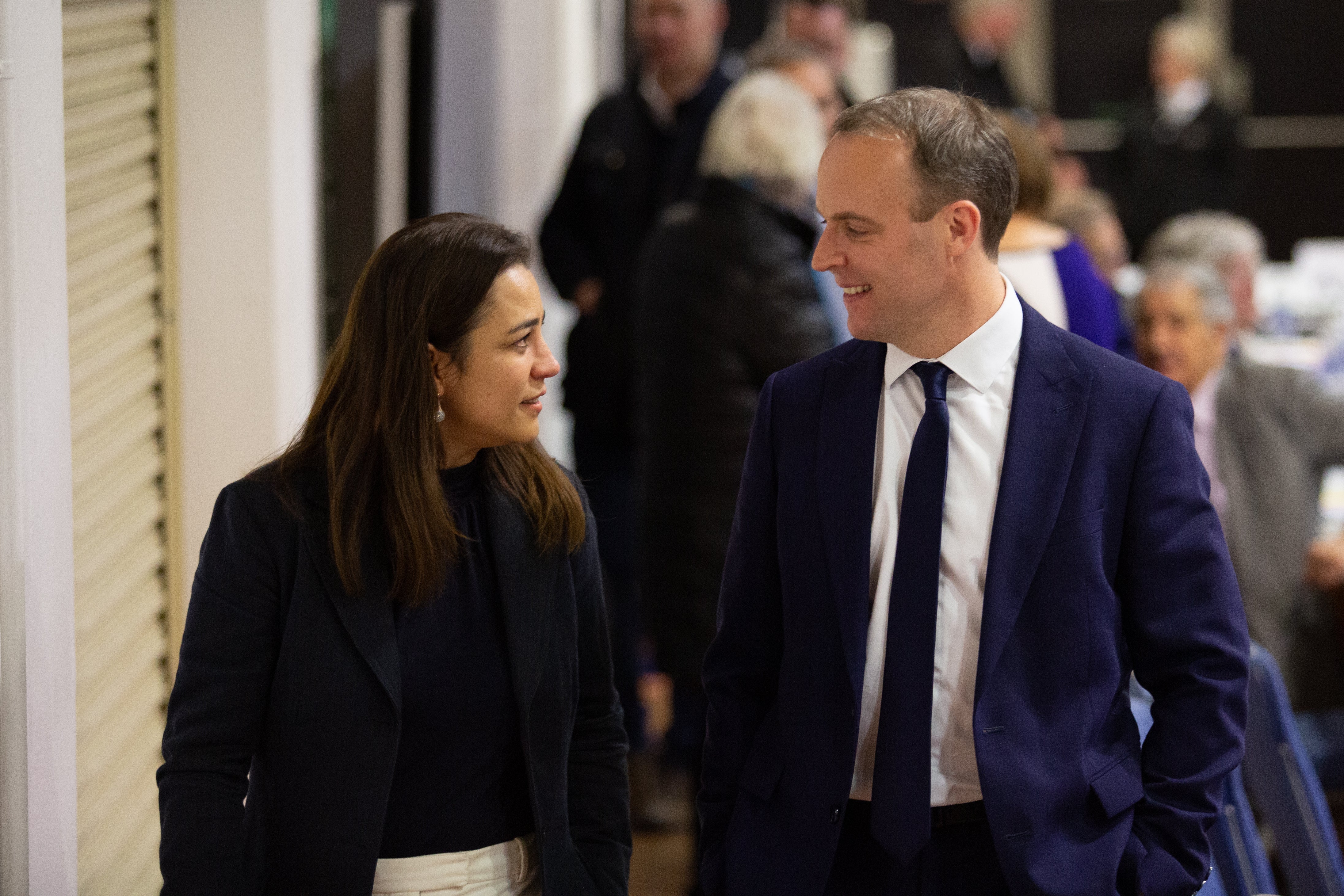
It would seem premature to write off Raab, who is not yet 50. He’s been in parliament since 2010 (and with ever-decreasing majorities in his formerly safe seat of Esher and Walton). He’s spent most of his time as a minister, reaching very high office. Partly, even mostly, that was through the accidental politics of the Brexit era, but there’s undoubtedly talent there.
If he was a better public speaker, of a more pragmatic disposition or someone with a little more natural empathy for voters, a touch of Johnson’s charm, say, he’d be a serious contender for the top job. He is thoughtful and intellectually curious, industrious and ambitious. He is tough enough, but thinks politics nowadays has a viciousness that “none of my karate training prepared me for”. He has great qualities. But there’s something missing.



Join our commenting forum
Join thought-provoking conversations, follow other Independent readers and see their replies
Comments